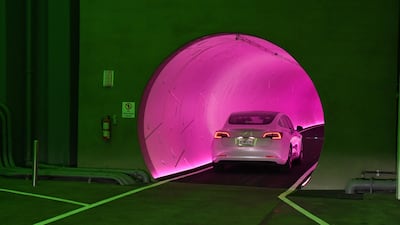Dubai is pressing ahead with plans to launch an Elon Musk-led high-speed underground road system next year as part of a major drive to modernise the emirate's transport network and cut congestion.
The first phase of the Dubai Loop, which is being developed by the entrepreneur's tunnelling company The Boring Company, will connect vital parts of the city with an alternative transit network built beneath existing roads. Dubai is embracing innovation and harnessing advanced technology to ease traffic flow and advance environmental goals amid a sustained population boom.
“The first loop is going to be operational, we’re hoping, by the second quarter of 2026,” Omar Al Olama, Minister of State for AI, Digital Economy and Remote Work Applications, told Bloomberg on Monday.
Plans for the Dubai Loop were unveiled in February at the World Governments Summit in Dubai. The government had said it was looking at a 17km system with 11 stations that could carry 20,000 passengers an hour.

The Boring Company already operates a loop in Las Vegas using Tesla vehicles to move passengers. During the announcement last year, Mr Musk said it would be like travelling through a “wormhole”.
“Once people try it out, they're going to say, 'Wow, it's really cool.' It's going to seem so obvious in retrospect,” he said. “It's going to be like a wormhole, from one part of the city, boom, and you're at another part of the city, and it's great. We look forward to this partnership.”
Part of Dubai’s future mobility model
The Dubai Loop is one of several future transport systems being developed to reshape mobility across the city over the next decade. It is expected to work alongside surface and aerial networks, rather than replace existing transport.
The Roads and Transport Authority (RTA) has previously said that future transport must be seamless, combining metro rail, buses, electric taxis, cycling networks and autonomous systems.
The RTA is showcasing a series of transport innovations at Gitex Global 2025, a technology exhibition being held in Dubai until Friday.
Trackless tram comes into view
One of the projects is the Trackless Tram, a next-generation public transport vehicle that moves like a tram but travels on normal roads instead of rails. The vehicle would be equipped with cameras and sensors to follow a set route on the road and can detect obstacles automatically that helps it move through safely through traffic.

Plans to to introduce all-electric trackless and autonomous trams at eight locations across the emirate were first announced in November last year to mark the 10th anniversary of the Dubai Tram.
“This year, our participation focuses on showcasing a wide range of smart projects that represent a transformative step in our digital transformation journey,” said Matter Al Tayer, director general of the RTA. “These include AI applications, predictive solutions based on big data analytics, and the use of the Internet of Things in managing assets and infrastructure.”
The RTA is also displaying a Smart Mobility Platform that would be used to monitor school transport and delivery vehicles using AI and data analytics. It would use AI and data analytics to monitor speed and driver behaviour.
The authority said progress is also being on air taxis, with test flights of a Joby Aviation electric vehicle already taking place. The National reported previously that the company has plans to begin commercial operations next year.
The service would cut travel time and could reduce traffic, with a journey from Dubai International Airport to Palm Jumeirah expected to take just 10 minutes, compared with about 45 minutes by car.
“We haven’t announced specific pricing, but our long-term goal is to offer pricing that is competitive to the cost of similar ground-based alternatives,” said Anthony Khoury, UAE general manager at the California company.


